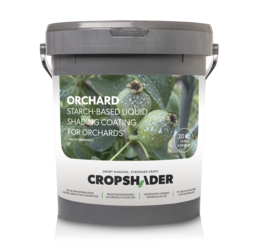
Cropshader Orchard
Cropshader Orchard is the next-generation orchard protection solution for growers facing rising heat stress and sunburn losses. Powered by Lumiforte’s advanced starch technology, this bio-based, biodegradable coating creates a thin, reflective film of micro-droplets on leaves and fruits. It lowers crop surface temperatures by up to 6 degrees Celsius without blocking stomata, ensuring plants can keep photosynthetic activity even under extreme summer conditions.
Tested across multiple crops—including apples, walnuts, olives, citrus, mandarins, and pomegranates—Cropshader consistently delivers measurable sunburn protection, improved photosynthetic efficiency, and higher marketable yields. Certified under EU Regulation (2019/1009) as a CE-marked Plant Biostimulant (PFC 6B) for woody perennials, Cropshader Orchard offers growers a safe, sustainable, and regulation-compliant alternative to costly shade nets or less effective sprays. With up to 30% reduction in sunburn-related losses, Cropshader helps secure fruit quality, yield stability, and profitability while reducing environmental impact.
- Reducing heat stress by decreasing leaf and fruit temperature
- Increasing photosynthetic activity by mitigating abiotic stress
- Biobased (93% of raw materials from natural origin ISO 16128)
- Readily biodegradable (OECD 301F)
- Higher UV reflection than PAR
Application Guide for Cropshader Orchard
Cropshader Orchard can be applied with manual sprayers, drones, or pulverizators, giving growers the flexibility to match the method to their orchard size, terrain, and labor resources. Regardless of the method, the goal is the same — a fine, even coating that forms a uniform protective film over leaves and fruit.
Weather conditions
- Wind speed of less than 2 m/s (7km/h).
- Relative humidity (RH) < 90%.
- Only apply when rain is not expected in the next approximate 12 hours.
Equipment
Cropshader can be applied with a (motorized) backpack sprayer, puliverizator or drone. Use 1.2 - 1.5 mm diameter nozzles and keep the mixture agitated during application.
- By hand with a spray gun
- By pulverizator
- By drone
- By helicopter
Personal protection
- Wear a safety mask, protective gloves, and protective clothing.
- Avoid breathing dust/fume/gas/mist/vapours/spray.
Application type/dilution (Per 10.000m2 = 1 ha)
* Water amount used per ha can differ, depending on the crop variety, canopy size and density.
| Application type | Product | Water | Total spraying liquid |
| Machine / Manual | 40 kg ≈ 28 L / 7.38 US gal | 800 L* / 211.3 US gal | 828 L / 218.7 US gal |
| Drone | 40 kg ≈ 28 L / 7.38 US gal | 200 L* / 52.8 US gal | 228 L / 60.2 US gal |
Application
- Stir the coating thoroughly before preparing the dilution.
- Fill the tank with clean water; ensure the tank is thoroughly cleaned.
- A 1:20 dilution (1kg product + 20kg water) with water is advised. Typically, 2 buckets (2 × 20kg) cover approximately 1 hectare.
- Adjust the dose based on local conditions and preferences, such as crop variety, canopy size, and density.
- Cropshader Orchard can be applied with a (motorized) backpack sprayer, pulverizator or drone. Use 1.2 – 1.5 mm diameter nozzles and keep the mixture agitated during application.
- Cropshader should be applied before the sunburn symptoms appear on the crops.
- The first application should be done when the fruit set starts and repeated after 2–3 weeks depending on the need.
- During application, avoid directly targeting leaves and fruits, prevent product run-off, and create a fine mist to allow particles to settle on the surface.
- It is recommended to conduct pre-mixture trials before mixing Cropshader with agrochemicals & fertilizers.
Post-harvest removal
- Washing of fruits is needed, unless only early-season applications were made and the coating is already worn off due to wind, rain, UV, and plant growth. White residue on crops can generally be removed on most commercial packing lines equipped with water-filled tanks and brushes.
Precautions
- Waste disposal according to official state regulations. Prevent entry to sewers and public waters.
Frequently asked questions
Field trials show reductions of up to 6 degrees Celsius compared to untreated fruit, significantly lowering the risk of sunburn damage.
It reflects harmful UVA, UVB, and infrared light, preventing fruit surface temperatures from exceeding damage thresholds (often after 35 °C). This helps avoid peel browning, tissue necrosis, and quality loss while reducing plant heat stress.
Multiple trials in Spain, Turkey, and the Netherlands show up to 30% temperature reduction and higher photosynthetic rates compared to untreated controls.